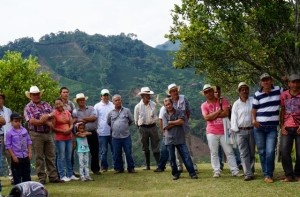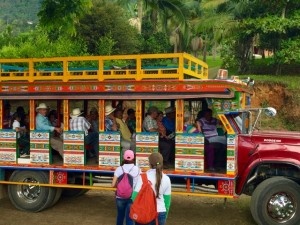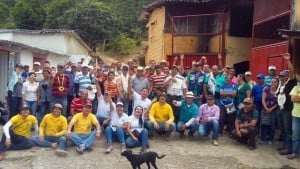From inside the shed come peals of laughter. I peer around the rusted metal double doors. Inside the long, narrow cinderblock structure, a group of men, women, and children sit on red plastic chairs and bags of fertilizers. They gather around a PowerPoint presentation projected onto a dusty whitish wall. In front, a yellow-clad agronomist talks animatedly, gesturing to the slides showing green, unripe, ripe, and overripe cherries. The laughter continues as he makes the group of farmers recite, in chorus, the five natural ways to avoid broca beetle infection.
 The group is taking part in an event called Field Days, jointly hosted by Cooperativa de los Andes (also known as CooperAndes) and the National Federation of Coffee Growers (FNC). At these Field Days, members of the organizations from a determined area gather at a farm early in the morning. Some know each other and joke or quietly talk, while others stand by with their hands behind their backs, kicking dust.
The group is taking part in an event called Field Days, jointly hosted by Cooperativa de los Andes (also known as CooperAndes) and the National Federation of Coffee Growers (FNC). At these Field Days, members of the organizations from a determined area gather at a farm early in the morning. Some know each other and joke or quietly talk, while others stand by with their hands behind their backs, kicking dust.
The purpose of Field Days is to disseminate new information and also to prepare farmers for certification visits (CooperAndes works with fair trade, Rainforest Alliance, UTZ and 4C). I recently took part in two of CooperAndes’ Field Days, and I saw a relaxed but serious event, where the farmers paid close attention to absorb as much information as they could. Instructors pontificated on four topics: natural pest control and proper safety when using agro-chemicals; social responsibility on farms; water treatment and conservation; and soil nutrition and analysis. Four groups of about 30 farmers rotated between the stations, spending 45 minutes at each. For their attention, the farmers were well fed and rewarded by raffles for ponchos and baseball caps.
 Overall, I was impressed by how interactive and participatory the events were. In addition to the formal sessions, there was a farm field trip in a colorful chiva bus with a group of farmers and about 15 children, ages 9 to 11. On that field trip, we visited the cooperative’s roaster, an award-winning small farmer, and a communal wet processing mill. The farmers were active participants at the field trip, encouraged to ask questions and get as much as possible out of the experience.
Overall, I was impressed by how interactive and participatory the events were. In addition to the formal sessions, there was a farm field trip in a colorful chiva bus with a group of farmers and about 15 children, ages 9 to 11. On that field trip, we visited the cooperative’s roaster, an award-winning small farmer, and a communal wet processing mill. The farmers were active participants at the field trip, encouraged to ask questions and get as much as possible out of the experience.
During the field days I pulled farmers aside—as part of a research project—and asked them their impressions of the event. Which station was the most interesting and relevant to them? “No, no, no. Todo, todo es muy interesante, es muy importante.” Everything is very interesting. Everything is very important.
 While on the one hand I was frustrated by the generality of their responses—and further probing rarely yielded more specificity—on the other I was struck by their sincerity. The farmers would go into detail about how they wanted to implement a water filtration system or how they planned to get a soil analysis in the coming weeks. They understood the importance of taking those measures. And then they would smile. If only there were money to make these investments. If only there wasn’t already so much work to do on the farm.
While on the one hand I was frustrated by the generality of their responses—and further probing rarely yielded more specificity—on the other I was struck by their sincerity. The farmers would go into detail about how they wanted to implement a water filtration system or how they planned to get a soil analysis in the coming weeks. They understood the importance of taking those measures. And then they would smile. If only there were money to make these investments. If only there wasn’t already so much work to do on the farm.
On the way back to Andes in the chiva, the children sang along to Reggaeton music, hyped up on malted soda. I turned to the great-grandmother beside me: “Did you learn anything today?” She smiled. “Yes, I want elevated drying beds like at the farm we visited!”
“Me too!” shouted an impish young voice behind us. We laughed.
These Field Days demonstrate the constant desire for knowledge and engagement of the producers we work with. We see in Andes how collaboration between the FNC, CooperAndes, farmers, and conscientious buyers yields an engaged community aimed at improving practices.



.png)
